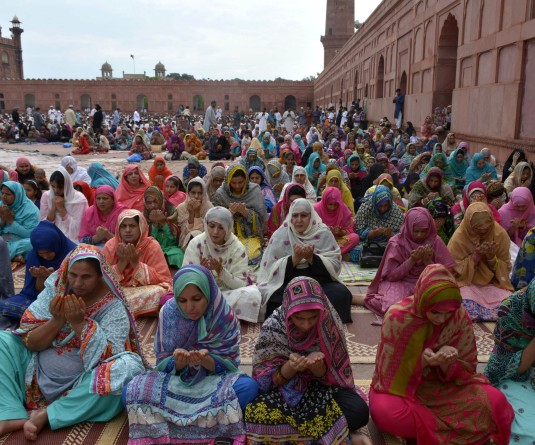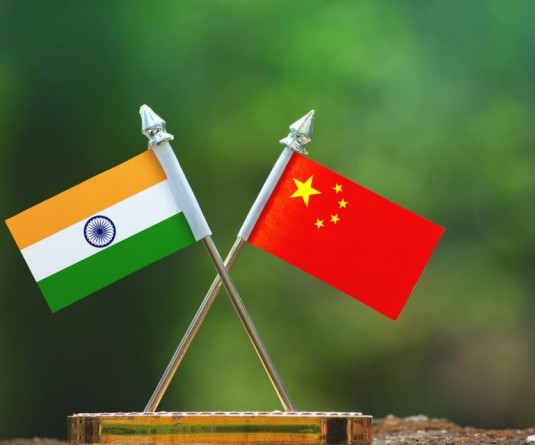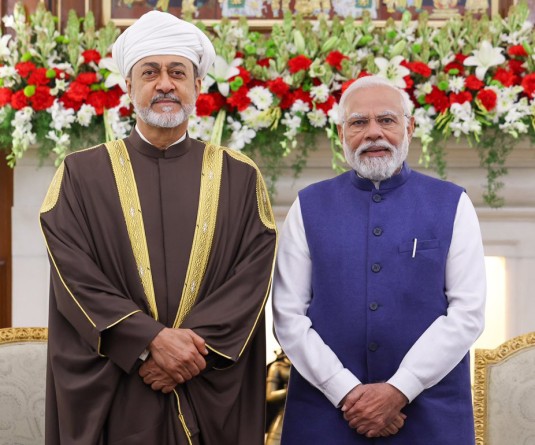
In this image taken during a trip organized by Libyan authorities, youth chant slogans during a staged pro-Libyan leader Moammar Gadhafi demonstration in Tamina, 3 miles (some 5 kilometers) South West of Misrata on Saturday, April 9. (AP Photo)
AJDABIYAH, Libya, April 10 (Reuters): Muammar Gaddafi's artillery heavily bombarded Ajdabiyah and his forces forced their way inside on Sunday in their most determined assault on the strategic eastern town for at least a week. Rebels cowered in alleyways from sustained artillery, rocket and small-arms fire and appeared to be losing control of the town, which is gateway to their stronghold of Benghazi 150 km (90 miles) up the Mediterranean coast to the north.
Ajdabiyah had been the launch point for insurgents during a week-long fight for the oil port of Brega further west and its fall would be a serious loss. Rebels said Gaddafi's forces killed at least four fighters in the second day of fighting for Ajdabiyah.
"I saw the four this morning. Their throats were slit and they were all shot through the chest and dumped on the road. Their car was also riddled with bullets," said a rebel, Mohammed Saad, at a checkpoint on the eastern edge of Ajdabiyah. Insurgent Hassan Bosayna said eight Gaddafi fighters and four rebels were killed in fighting on Saturday, with one of the rebels shot in the forehead by a sniper. Another rebel, Muftah, said: "There are Gaddafi forces inside Ajdabiyah in sand-colored Land Cruisers and we know there are snipers in civilian clothing in the city as well."
Gaddafi's artillery shelled the western approaches all morning and two rockets landed in the center in the middle of the day. There were long exchanges of small arms fire.
The streets were deserted as insurgents guarded various crossroads and dashed around in pick-ups.
The mostly untrained rebels have tried to reorganize and re-equip but were unable to hold ground last week against Gaddafi's better-armed forces in the fight for Brega.
AFRICAN UNION PEACE MISSION
A high-level African Union delegation led by South African President Jacob Zuma was due in Tripoli on Sunday to try to kindle peace talks between the two sides. South African officials said the delegation, which also included the leaders of Mauritania, Congo, Mali and Uganda, would meet rebel leaders in Benghazi after talking to Gaddafi.
Western officials have acknowledged that their air power will not be enough to help the rag-tag rebels overthrow Gaddafi by force and they are now emphasizing a political solution. But a rebel spokesman rejected a negotiated outcome in the conflict, the bloodiest in a series of pro-democracy revolts across the Arab world that have already dethroned the leaders of Tunisia and Egypt.
"There is no other solution than the military solution, because this dictator's language is annihilation, and people who speak this language only understand this language," spokesman Ahmad Bani told al Jazeera television. Analysts predict a long, low-level conflict possibly leading to partition between east and west in the sprawling North African Arab country.
Gaddafi's government sought to showcase a reform-friendly face on Sunday, gathering foreign journalists in the early hours of the morning to unveil a "Libyan version" of democracy. Details were vague and officials could not explain what Gaddafi's role would be, but it was clear he would continue to play a leading role. Insurgents say they want democracy in Libya without Gaddafi, who has ruled with an iron hand for 41 years.
The fight for Ajdabiyah on Sunday followed pitched battles on Saturday when rebels fought off a heavy assault by government forces on the besieged western coastal city of Misrata.
One insurgent there said 30 fighters were killed but another said there were eight confirmed dead and 10 unconfirmed. Rebels in Misrata, a lone rebel bastion in western Libya which has been under siege for six weeks, hailed more muscular NATO operations against Gaddafi's besieging forces.
The alliance confirmed an increased tempo of attacks and said it had destroyed 17 government tanks between Friday and Saturday, 15 near Misrata and two south of Brega. Gaddafi's forces appear bent on seizing Misrata and crucially its port, which some analysts say is vital if Gaddafi is to survive because it supplies the capital Tripoli.
Rebel spokesman Mustafa Abdulrahman said by telephone that Saturday's Misrata fighting centered on a road to the port, where a Red Cross vessel brought in badly needed medical supplies earlier in the day. As fighting raged on for the coastal town, where conditions are said to be desperate, a buoyant Muammar Gaddafi made his first television appearance for five days on Saturday.
Wearing his trademark brown robes and dark glasses, he was shown smiling and pumping his fists in the air at a school where he was welcomed ecstatically. Women ululated, one wept with emotion and pupils chanted anti-western slogans.
Gaddafi looked relaxed, confirming the impression among analysts that his administration has emerged from a period of paralysis and is hunkering down for a long campaign.
Ajdabiyah had been the launch point for insurgents during a week-long fight for the oil port of Brega further west and its fall would be a serious loss. Rebels said Gaddafi's forces killed at least four fighters in the second day of fighting for Ajdabiyah.
"I saw the four this morning. Their throats were slit and they were all shot through the chest and dumped on the road. Their car was also riddled with bullets," said a rebel, Mohammed Saad, at a checkpoint on the eastern edge of Ajdabiyah. Insurgent Hassan Bosayna said eight Gaddafi fighters and four rebels were killed in fighting on Saturday, with one of the rebels shot in the forehead by a sniper. Another rebel, Muftah, said: "There are Gaddafi forces inside Ajdabiyah in sand-colored Land Cruisers and we know there are snipers in civilian clothing in the city as well."
Gaddafi's artillery shelled the western approaches all morning and two rockets landed in the center in the middle of the day. There were long exchanges of small arms fire.
The streets were deserted as insurgents guarded various crossroads and dashed around in pick-ups.
The mostly untrained rebels have tried to reorganize and re-equip but were unable to hold ground last week against Gaddafi's better-armed forces in the fight for Brega.
AFRICAN UNION PEACE MISSION
A high-level African Union delegation led by South African President Jacob Zuma was due in Tripoli on Sunday to try to kindle peace talks between the two sides. South African officials said the delegation, which also included the leaders of Mauritania, Congo, Mali and Uganda, would meet rebel leaders in Benghazi after talking to Gaddafi.
Western officials have acknowledged that their air power will not be enough to help the rag-tag rebels overthrow Gaddafi by force and they are now emphasizing a political solution. But a rebel spokesman rejected a negotiated outcome in the conflict, the bloodiest in a series of pro-democracy revolts across the Arab world that have already dethroned the leaders of Tunisia and Egypt.
"There is no other solution than the military solution, because this dictator's language is annihilation, and people who speak this language only understand this language," spokesman Ahmad Bani told al Jazeera television. Analysts predict a long, low-level conflict possibly leading to partition between east and west in the sprawling North African Arab country.
Gaddafi's government sought to showcase a reform-friendly face on Sunday, gathering foreign journalists in the early hours of the morning to unveil a "Libyan version" of democracy. Details were vague and officials could not explain what Gaddafi's role would be, but it was clear he would continue to play a leading role. Insurgents say they want democracy in Libya without Gaddafi, who has ruled with an iron hand for 41 years.
The fight for Ajdabiyah on Sunday followed pitched battles on Saturday when rebels fought off a heavy assault by government forces on the besieged western coastal city of Misrata.
One insurgent there said 30 fighters were killed but another said there were eight confirmed dead and 10 unconfirmed. Rebels in Misrata, a lone rebel bastion in western Libya which has been under siege for six weeks, hailed more muscular NATO operations against Gaddafi's besieging forces.
The alliance confirmed an increased tempo of attacks and said it had destroyed 17 government tanks between Friday and Saturday, 15 near Misrata and two south of Brega. Gaddafi's forces appear bent on seizing Misrata and crucially its port, which some analysts say is vital if Gaddafi is to survive because it supplies the capital Tripoli.
Rebel spokesman Mustafa Abdulrahman said by telephone that Saturday's Misrata fighting centered on a road to the port, where a Red Cross vessel brought in badly needed medical supplies earlier in the day. As fighting raged on for the coastal town, where conditions are said to be desperate, a buoyant Muammar Gaddafi made his first television appearance for five days on Saturday.
Wearing his trademark brown robes and dark glasses, he was shown smiling and pumping his fists in the air at a school where he was welcomed ecstatically. Women ululated, one wept with emotion and pupils chanted anti-western slogans.
Gaddafi looked relaxed, confirming the impression among analysts that his administration has emerged from a period of paralysis and is hunkering down for a long campaign.
South Africa’s Zuma to meet Gaddafi in mediation effort
JOHANNESBURG, April 10 (Reuters): South African President Jacob Zuma and four African leaders planned to meet Libya's Muammar Gaddafi Sunday and also see rebels seeking his ouster in an African Union effort to mediate in Libya's civil war. Zuma was part of a five-man AU panel of presidents including Mali's Amadou Toumani Toure, Congo's Denis Sassou Nguessou, Uganda's Yoweri Museveni and Mauritania's Mohamed Ould Abdel Aziz, charged with finding a solution to the crisis.
"The Committee has been granted permission by NATO to enter Libya and to meet in Tripoli with ... Gaddafi. The AU delegation will also meet with the (rebel) Interim Transitional National Council in Benghazi on 10 and 11 April," a statement from the South African presidency said. The national council based in rebel-held eastern Libya having been fighting for two months to unseat Gaddafi, who has been in power since a 1969 coup, and have won recognition from France, Italy and Qatar. Before departure for Libya, the AU panel said in a statement from the Mauritanian capital Nouakchott that their objective was to stop the military operations and propose appropriate political solutions that might resolve the crisis.
N Korea orders nationals in Libya ‘not to return’
SEOUL, April 10 (AFP): North Korea has ordered its citizens in Libya not to return home in an apparent bid to block news of civil uprisings in the Arab World from reaching the isolated communist state, a report said today. Pyongyang, in a message sent to its embassy in Libya, told some 200 North Korean workers not to return and to follow local authorities’ advice, Yonhap news agency said, citing a source familiar with North Korean affairs. “(The North) did so because it was afraid the news of Libya’s civil unrest would spread within North Korea,” said the source quoted by Yonhap.
The impoverished communist state sent hundreds of workers including doctors, nurses and construction labourers to oil-rich nations including Libya, Saudi Arabia and Kuwait to earn much-needed foreign cash, Yonhap said. Countries have rushed to evacuate nationals from the North African country since deadly clashes broke out between rebels and forces loyal to leader Muammer Gaddafi in February. Pyongyang and Tripoli have maintained close diplomatic ties, with Kadhafi described in the North as a “revolutionary comrade” of leader Kim Jong-II, according to defectors from the North.
Experts say the North has stepped up its campaign to block information on pro-democracy protests in the Arab World, fearing they could spark similar disturbances among its own people against the ruling Kim dynasty. The North tightly controls access to the Internet and attempts to block other sources of information about the outside world, though DVDs and mobile phones smuggled from China have been eroding barriers.
JOHANNESBURG, April 10 (Reuters): South African President Jacob Zuma and four African leaders planned to meet Libya's Muammar Gaddafi Sunday and also see rebels seeking his ouster in an African Union effort to mediate in Libya's civil war. Zuma was part of a five-man AU panel of presidents including Mali's Amadou Toumani Toure, Congo's Denis Sassou Nguessou, Uganda's Yoweri Museveni and Mauritania's Mohamed Ould Abdel Aziz, charged with finding a solution to the crisis.
"The Committee has been granted permission by NATO to enter Libya and to meet in Tripoli with ... Gaddafi. The AU delegation will also meet with the (rebel) Interim Transitional National Council in Benghazi on 10 and 11 April," a statement from the South African presidency said. The national council based in rebel-held eastern Libya having been fighting for two months to unseat Gaddafi, who has been in power since a 1969 coup, and have won recognition from France, Italy and Qatar. Before departure for Libya, the AU panel said in a statement from the Mauritanian capital Nouakchott that their objective was to stop the military operations and propose appropriate political solutions that might resolve the crisis.
N Korea orders nationals in Libya ‘not to return’
SEOUL, April 10 (AFP): North Korea has ordered its citizens in Libya not to return home in an apparent bid to block news of civil uprisings in the Arab World from reaching the isolated communist state, a report said today. Pyongyang, in a message sent to its embassy in Libya, told some 200 North Korean workers not to return and to follow local authorities’ advice, Yonhap news agency said, citing a source familiar with North Korean affairs. “(The North) did so because it was afraid the news of Libya’s civil unrest would spread within North Korea,” said the source quoted by Yonhap.
The impoverished communist state sent hundreds of workers including doctors, nurses and construction labourers to oil-rich nations including Libya, Saudi Arabia and Kuwait to earn much-needed foreign cash, Yonhap said. Countries have rushed to evacuate nationals from the North African country since deadly clashes broke out between rebels and forces loyal to leader Muammer Gaddafi in February. Pyongyang and Tripoli have maintained close diplomatic ties, with Kadhafi described in the North as a “revolutionary comrade” of leader Kim Jong-II, according to defectors from the North.
Experts say the North has stepped up its campaign to block information on pro-democracy protests in the Arab World, fearing they could spark similar disturbances among its own people against the ruling Kim dynasty. The North tightly controls access to the Internet and attempts to block other sources of information about the outside world, though DVDs and mobile phones smuggled from China have been eroding barriers.



.jpg)


